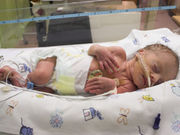By seventh grade, four out of 10 failed to meet standards in at least one academic area
MONDAY, Jan. 16, 2017 (HealthDay News) — Children with neonatal abstinence syndrome (NAS) may be more likely to perform poorly in school, according to a new study published online Jan. 16 in Pediatrics.
The study included 2,234 children born with NAS in New South Wales, Australia, between 2000 and 2006. The researchers based their results on tests given in third, fifth, and seventh grades. They compared the children with NAS with a control group of 4,330 children unaffected by the syndrome. Both groups were matched for socioeconomic status, gender, and time spent in the womb. The test results were also compared with those of 598,265 other New South Wales children.
Test scores for children with NAS, on average, were sharply lower than those of both groups of children. By seventh grade, their scores were lower than those of fifth-grade children. The researchers also found that 37.7 percent of these seventh graders failed to meet test standards in at least one of the tested areas.
“These drugs cause brain cells to die more quickly and impair their proper development,” lead author Ju-Lee Oei, M.D., a senior neonatologist at the Royal Hospital for Women in New South Wales, told HealthDay. Families affected by addiction also may be more “socially chaotic,” the study authors said. “Early intervention and support for both the mothers and their children have been shown to be extremely effective in high-risk populations, and the benefits can extend for decades and even into generations,” Oei said.
Full Text (subscription or payment may be required)
Copyright © 2017 HealthDay. All rights reserved.








